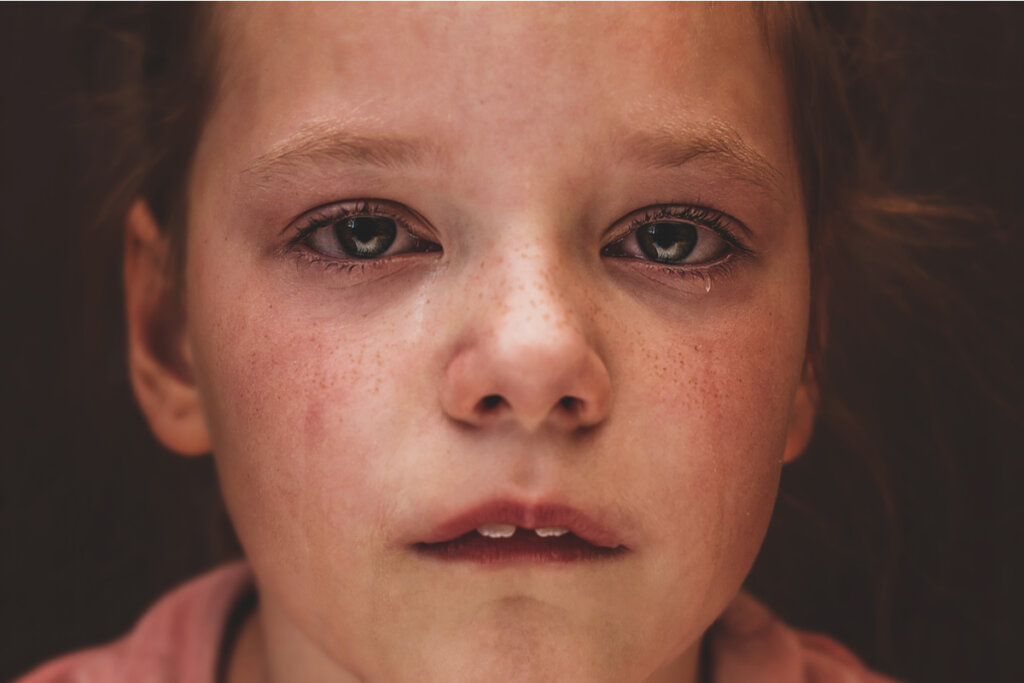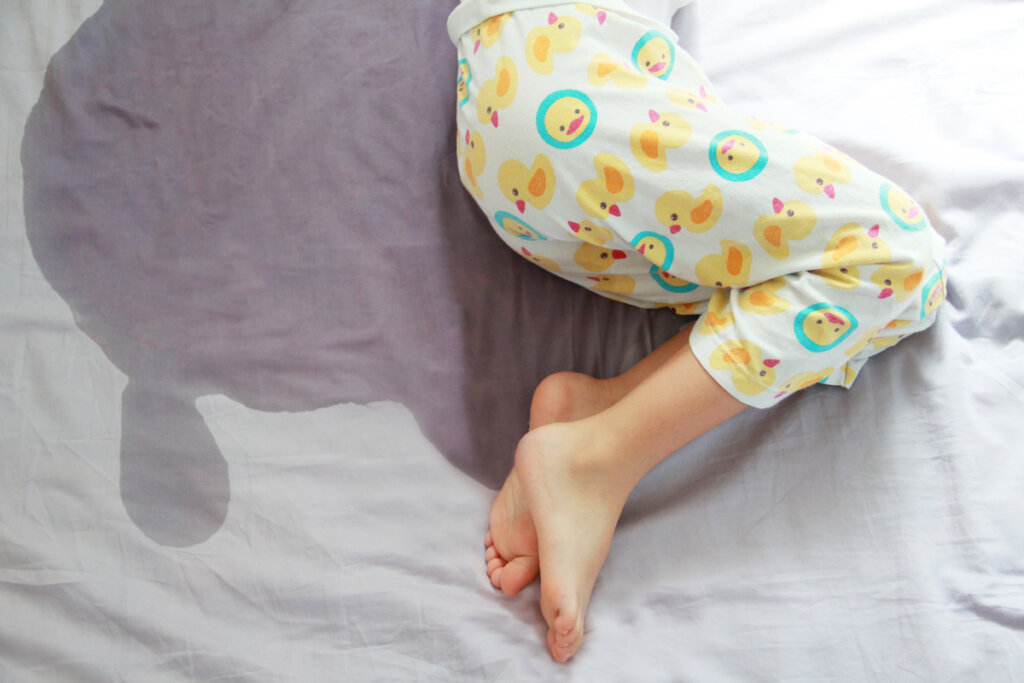Seven Signs That a Child Isn't Happy

It’s not always easy to recognize when a child isn’t happy. That’s because there may not be any marked changes in their behavior or in the way they express themselves. There are also some changes that can be misinterpreted. In fact, sometimes they may be top of the class but inside they’re deeply unhappy.
The language of children is different from that of adults. In order to recognize whether a child is happy or not, you have to observe them and understand their codes of expression. For example, many children express sadness with signs that you might think of as tiredness or anger.
The signs that a child isn’t happy may be seen in their attitudes and the perspective they adopt toward simple actions, such as eating or sleeping. Action should always be taken as soon as possible because, if the problems continue, everything can become more complex. The following are aspects of unhappiness in a child.
“Every child should have a sign that says: ‘Handle with care. Contains dreams.”
-Mirko Badiale-

1. Sudden mood swings
Sudden mood swings suggest that there are many heightened emotions within the child. The key is in the word ‘sudden’. Indeed, it’s perfectly normal for there to be mood swings but, if they appear suddenly, they signify instability.
These changes are even more revealing when the emotions involved are extremely intense or contradictory to each other. For example, going from euphoria to extreme introspection or from calm to an outburst of anger.
2. Lack of interest in playing or playing aggressively
Play is the main means of expression for children. It’s their own little world and the environment in which they express themselves most authentically. That’s why it’s always important to be attentive to the way they play, the type of games that attract their attention, and the roles they assume in them.
One unequivocal sign that a child isn’t happy is when they lack interest in playing their usual games. Another worrying sign is when they adopt a violent attitude when they’re playing or show aggression toward their playmates.
3. Getting sick frequently
Unhappy children tend to get sicker than others. Due to their mood, they tend to suffer conditions associated with the immune system, such as frequent infections or allergies. When a child gets extremely sick, it should always be cause for attention.
Many parents tend to give importance only to their child’s physical condition. In principle, this is correct, but they should also assess their mood, since this may be at the base of their condition.
4. Little appetite
Lack of appetite alone can’t be considered a sign that a child isn’t happy. The reason why this occurs must first be analyzed. For instance, sometimes they’re left to snack all day, hence they’re no longer hungry at mealtimes.
It can also happen that the mother is extremely anxious about feeding and the child reacts by refusing food. Sometimes, it’s a sign of a bad relationship with the mother or it can signify sadness and disinterest. Therefore, the situation must be carefully assessed.
5. Frequent nightmares and night terrors
Nightmares and night terrors are extremely common in children. In fact, most children experience them at some point and, in most cases, they only require understanding and support so that they don’t recur.
However, if they happen frequently it could be a sign that a child isn’t happy. It implies that they feel stressed for some reason, or have a dormant conflict that’s expressed in this way. It can also happen because the little one experiences a kind of abandonment, be it real or fictitious.
6. Wetting the bed
Enuresis, or wetting the bed when they’ve gone through the potty training phase, is a really telling sign. Consequently, when it continues to occur after the age of six, it suggests problems.
In younger children, it may be due to too deep sleep. Nevertheless, when they’re older, it’s a symptom of anxiety. Indeed, if a child suffers enuresis for six months, a professional should be consulted.

7. Avoiding places of social contact
While school may not be where children really want to spend their time, it shouldn’t upset them too much to attend class either. Large manifestations of anxiety in the face of such a daily event are always a sign that requires attention.
There could be several reasons for this anxiety. Perhaps there’s something or someone at school that’s generating fear or apprehension in the child. They may also see school as an extremely frustrating place, where they only receive aversive stimuli. In any case, to carry out an intervention, it’s necessary to establish the cause. This will often require the collaboration of the school.
When a child isn’t happy, they’ll find it difficult to live their childhood to the full. This, in turn, will cause difficulties in their adolescence and adult life. Therefore, it’s essential not to ignore the signs and to solve these problems in time.
It’s not always easy to recognize when a child isn’t happy. That’s because there may not be any marked changes in their behavior or in the way they express themselves. There are also some changes that can be misinterpreted. In fact, sometimes they may be top of the class but inside they’re deeply unhappy.
The language of children is different from that of adults. In order to recognize whether a child is happy or not, you have to observe them and understand their codes of expression. For example, many children express sadness with signs that you might think of as tiredness or anger.
The signs that a child isn’t happy may be seen in their attitudes and the perspective they adopt toward simple actions, such as eating or sleeping. Action should always be taken as soon as possible because, if the problems continue, everything can become more complex. The following are aspects of unhappiness in a child.
“Every child should have a sign that says: ‘Handle with care. Contains dreams.”
-Mirko Badiale-

1. Sudden mood swings
Sudden mood swings suggest that there are many heightened emotions within the child. The key is in the word ‘sudden’. Indeed, it’s perfectly normal for there to be mood swings but, if they appear suddenly, they signify instability.
These changes are even more revealing when the emotions involved are extremely intense or contradictory to each other. For example, going from euphoria to extreme introspection or from calm to an outburst of anger.
2. Lack of interest in playing or playing aggressively
Play is the main means of expression for children. It’s their own little world and the environment in which they express themselves most authentically. That’s why it’s always important to be attentive to the way they play, the type of games that attract their attention, and the roles they assume in them.
One unequivocal sign that a child isn’t happy is when they lack interest in playing their usual games. Another worrying sign is when they adopt a violent attitude when they’re playing or show aggression toward their playmates.
3. Getting sick frequently
Unhappy children tend to get sicker than others. Due to their mood, they tend to suffer conditions associated with the immune system, such as frequent infections or allergies. When a child gets extremely sick, it should always be cause for attention.
Many parents tend to give importance only to their child’s physical condition. In principle, this is correct, but they should also assess their mood, since this may be at the base of their condition.
4. Little appetite
Lack of appetite alone can’t be considered a sign that a child isn’t happy. The reason why this occurs must first be analyzed. For instance, sometimes they’re left to snack all day, hence they’re no longer hungry at mealtimes.
It can also happen that the mother is extremely anxious about feeding and the child reacts by refusing food. Sometimes, it’s a sign of a bad relationship with the mother or it can signify sadness and disinterest. Therefore, the situation must be carefully assessed.
5. Frequent nightmares and night terrors
Nightmares and night terrors are extremely common in children. In fact, most children experience them at some point and, in most cases, they only require understanding and support so that they don’t recur.
However, if they happen frequently it could be a sign that a child isn’t happy. It implies that they feel stressed for some reason, or have a dormant conflict that’s expressed in this way. It can also happen because the little one experiences a kind of abandonment, be it real or fictitious.
6. Wetting the bed
Enuresis, or wetting the bed when they’ve gone through the potty training phase, is a really telling sign. Consequently, when it continues to occur after the age of six, it suggests problems.
In younger children, it may be due to too deep sleep. Nevertheless, when they’re older, it’s a symptom of anxiety. Indeed, if a child suffers enuresis for six months, a professional should be consulted.

7. Avoiding places of social contact
While school may not be where children really want to spend their time, it shouldn’t upset them too much to attend class either. Large manifestations of anxiety in the face of such a daily event are always a sign that requires attention.
There could be several reasons for this anxiety. Perhaps there’s something or someone at school that’s generating fear or apprehension in the child. They may also see school as an extremely frustrating place, where they only receive aversive stimuli. In any case, to carry out an intervention, it’s necessary to establish the cause. This will often require the collaboration of the school.
When a child isn’t happy, they’ll find it difficult to live their childhood to the full. This, in turn, will cause difficulties in their adolescence and adult life. Therefore, it’s essential not to ignore the signs and to solve these problems in time.
All cited sources were thoroughly reviewed by our team to ensure their quality, reliability, currency, and validity. The bibliography of this article was considered reliable and of academic or scientific accuracy.
Cyrulnik, B. (2014). Cuando un niño se da muerte (Vol. 100617). Editorial Gedisa.
This text is provided for informational purposes only and does not replace consultation with a professional. If in doubt, consult your specialist.







